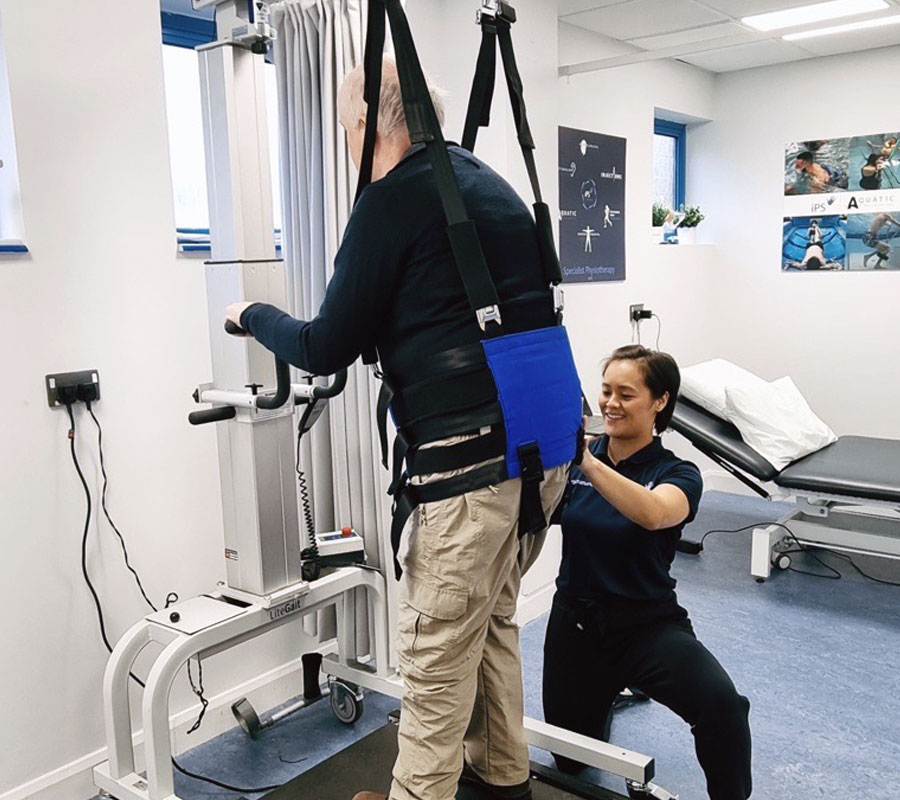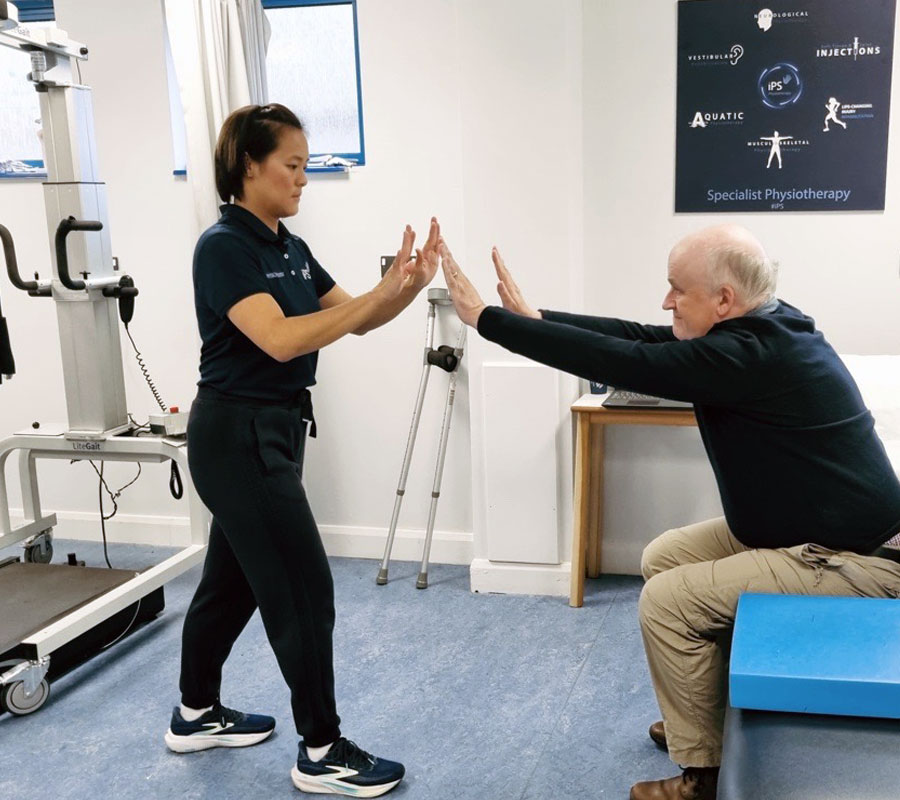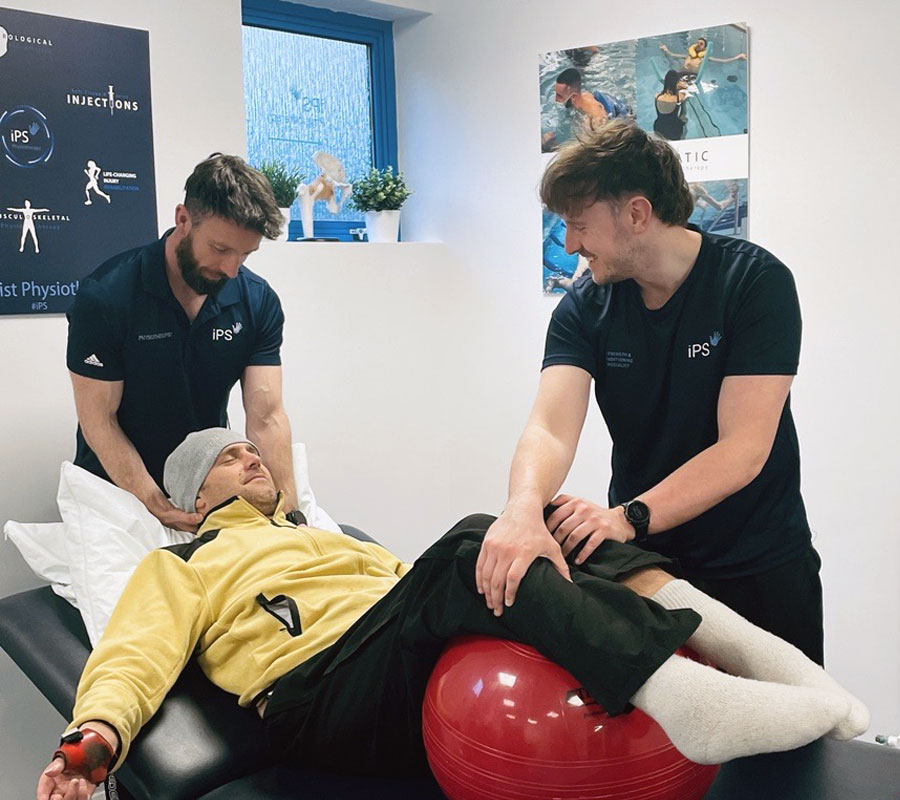
Neurological Physiotherapy
Neurological physiotherapy at iPS Clinics in Bridgend, Cardiff, Carmarthen, Newport, Porthcawl or at your home.
Neurological physiotherapy focuses on treating conditions that affect the nervous system, such as stroke, Parkinson’s disease, multiple sclerosis, and spinal cord injuries. At iPS Physiotherapy, our specialist neurological physiotherapists provide tailored rehabilitation programmes to help individuals improve their movement, strength, and coordination, enhancing their overall quality of life. Our goal is to help you regain independence, reduce disability, and promote better function through targeted exercises and therapeutic techniques.
✓ Free Parking is available at all our clinics.
*Please book an Initial Consultation if you have not been seen before or if you have a new condition that needs assessment.

Neurological Physiotherapy Initial Consultaton
Appointment Type: *Initial Consultation & treatment where appropriate.
£100
Time: 60 minutes. Please contact us on 03456 252 252 to arrange a home visit.

Neurological Physiotherapy Standard Follow-Up Consultaton
Appointment Type: *Follow-up Consultation/Treatment.
£100
Time: 60 minutes
Time: 60 minutes. Please contact us on 03456 252 252 to arrange a home visit.

How Neurological Physiotherapy Works
Neurological physiotherapy involves a comprehensive assessment to understand how your condition is affecting your mobility, balance, and coordination. Using evidence-based techniques, our physiotherapists develop a personalised treatment plan to address your unique challenges. This may include exercises to improve muscle strength, coordination, and flexibility, as well as balance training, gait training, and posture correction. Neuroplasticity (the brain’s ability to adapt and reorganise) is encouraged through repetitive and functional movement exercises, with a focus on restoring normal movement patterns and improving independence.
The IPS have a team of specialist neurological physiotherapists and a network of treatment facilities including Hydrotherapy facilities, throughout South Wales. We utilise a range of specialist equipment and treatment techniques to assist with neurological rehabilitation.
Our neurological physiotherapists can provide detailed assessment and treatment either at one of our Specialist Rehabilitation Centres or within a patient's own home. A detailed assessment into the patient's impairments and functional ability will be completed and from this assessment, a mutually agreed treatment program will be developed to help achieve the patient's own personal goals.
To ensure optimal communication and therapeutic intervention we are happy to liaise with other health professionals that may be involved in a person's care, from private, social and/or healthcare services.
Our Specialist Neurological Physiotherapists are experienced in utilising a broad range of well-established neurological hands-on treatment techniques, such as the Bobath Concept and functional exercise-based rehabilitation. They also incorporate evidenced based treatment techniques including Task Repetition training, strength and conditioning programmes, manual therapy, stretching, postural re-education, acupuncture, gait re-education, sensory and balance retraining and advice on appropriate aids, equipment and adaptations.
We are extremely proud of the quality of our Specialist Rehabilitation Centres throughout South Wales. We have a range of specialist equipment that enables us to rehabilitate our clients to their potential. The specialist equipment includes a LiteGait Bodyweight Support System, Gaitkeeper Treadmill, Hoist, a range of Saebo Technology - including Saebo Rejoyce, a range of Functional Electrical Stimulation units, Thera-Trainer Cycle, and Alter-G Anti-gravity Treadmill. As well as specialist technology, we have a range of traditional equipment including large (neuro) treatment plinths, parallel bars and extensive gym facilities. We also have access to a hydrotherapy pool with warm water, excellent disabled changing facilities and hoist pool access.
Benefits of Neurological Physiotherapy
- Improves movement, strength, and coordination
- Reduces muscle spasticity and stiffness
- Enhances balance and gait
- Increases independence in daily activities
- Promotes neuroplasticity and recovery
- Provides support for managing neurological symptoms and challenges
Conditions Treated with Neurological Physiotherapy
- Stroke rehabilitation
- Parkinson’s disease
- Multiple sclerosis
- Spinal cord injuries
- Cerebral palsy
- Traumatic brain injuries
- Balance and coordination disorders

Frequently Asked Questions
What does a neurological physiotherapy session involve?
During a session, your physiotherapist will assess your condition and design a treatment plan that targets your specific needs. This may include exercises to improve strength, coordination, and balance, as well as techniques to reduce muscle spasticity and stiffness. Your physiotherapist will work with you at your own pace, ensuring that exercises are performed safely and effectively.
How long will it take to see results with neurological physiotherapy?
The time it takes to see results depends on the severity of your condition and your personal goals. Some patients may notice improvements after a few weeks, while others may take longer to see significant progress. Your physiotherapist will monitor your progress and adjust your treatment plan as needed.
Can neurological physiotherapy help with Parkinson's disease?
Yes, neurological physiotherapy can be very effective for individuals with Parkinson’s disease. It helps improve mobility, reduce stiffness, and enhance balance and coordination. Regular physiotherapy can also help slow the progression of symptoms and improve the overall quality of life.

Neurological Physiotherapy Conditions
Stroke
A stroke (CVA-cerebral vascular accident) occurs when the blood supply to part of the brain is compromised. This occurs due to a blood clot (ischaemic stroke) or a bleed within the brain (haemorrhagic stroke). The symptoms of a stroke are very dependent upon the area of the brain that has been starved of oxygen due to the restricted blood supply. Typical symptoms of a stroke include a one-sided facial droop, weakness in an arm and leg on the same side of the body and slurred speech. Those who have suffered from a stroke can have difficulty with balance and coordination and may also suffer with confusion or struggle to process information quickly.
Spinal Cord Injury
A spinal cord injury (SCI) describes damage to any part of the spinal cord or spinal nerves. It can often lead to permanent changes to strength, sensation and other body functions below the level of the spinal cord injury.
The degree and nature of the symptoms experienced following a SCI is dependent upon the level of the injury along the spinal cord and the severity of that injury. SCI's are classified as either being a complete injury: all sensory and motor function is lost below the level of injury; or incomplete: some sensory and motor function below the level of injury remains. The amount of movement and function remaining is again dependent upon the severity of the damage to the spinal cord.
Physiotherapy for SCI includes spasticity and pain management, strengthening, core control, postural advice, treatment of secondary complications such as musculoskeletal injuries or respiratory problems.
Parkinson's Disease
Symptoms of PD include involuntary shaking (tremor), slowness of movement and tight stiff muscles. Other symptoms include poor balance and coordination which increases the risk of falls, and memory problems.
Physiotherapy for PD includes posture and balance work, multitasking exercises, strength, and global fitness.
Motor Neurone Disease
Motor neurones in the brain stop working and this causes progressive weakness. Symptoms include muscle weakness in hands, feet and legs, and one of the first symptoms typically noticed by an individual is muscle twitching. Later on in the disease, patients may develop speech and swallow problems.
Physiotherapy for MND concentrates on optimising movement and function to assist with slowing the progression of symptoms. Spasticity management is appropriate for those who get tight cramping muscles.
Multiple Sclerosis
Multiple Sclerosis (MS) is a long term condition affecting the brain and spinal cord. The body's immune system mistakes myelin (protective layer around nerve fibres) for a foreign body and therefore attacks it, damaging the myelin and often the nerve fibre underneath. The damage caused leads to scars or lesions. These lesions prevents the effective transmission of messages along the nerve fibre.
Symptoms of MS are related to where the nerve lesions are sited within the brain and spinal cord, but include symptoms such as altered vision, poor balance, muscle weakness and cramps, memory problems and bladder and bowel difficulties.
Physiotherapy for MS involves core stability work, muscle strengthening, balance retraining, gait re-education, advice on walking aids and splinting if required.
Brain Injuries
A brain injury can be acquired- i.e. develop after birth for many reasons such as development of encephalitis or other brain infections; or traumatic- resulting from a direct injury to the brain caused by road traffic accidents, assaults, accidents or falls.
Symptoms depend on what part of the brain has been damaged and may include muscle weakness, spasticity, poor balance, poor memory and altered thinking processes.
Physiotherapy for brain injuries aims to encourage brain reorganisation, utilising parts of the brain that have not been damaged. Strength, balance, gait retraining, and spasticity management usually form the shape of a rehabilitation programme for someone who has suffered from a brain injury.









